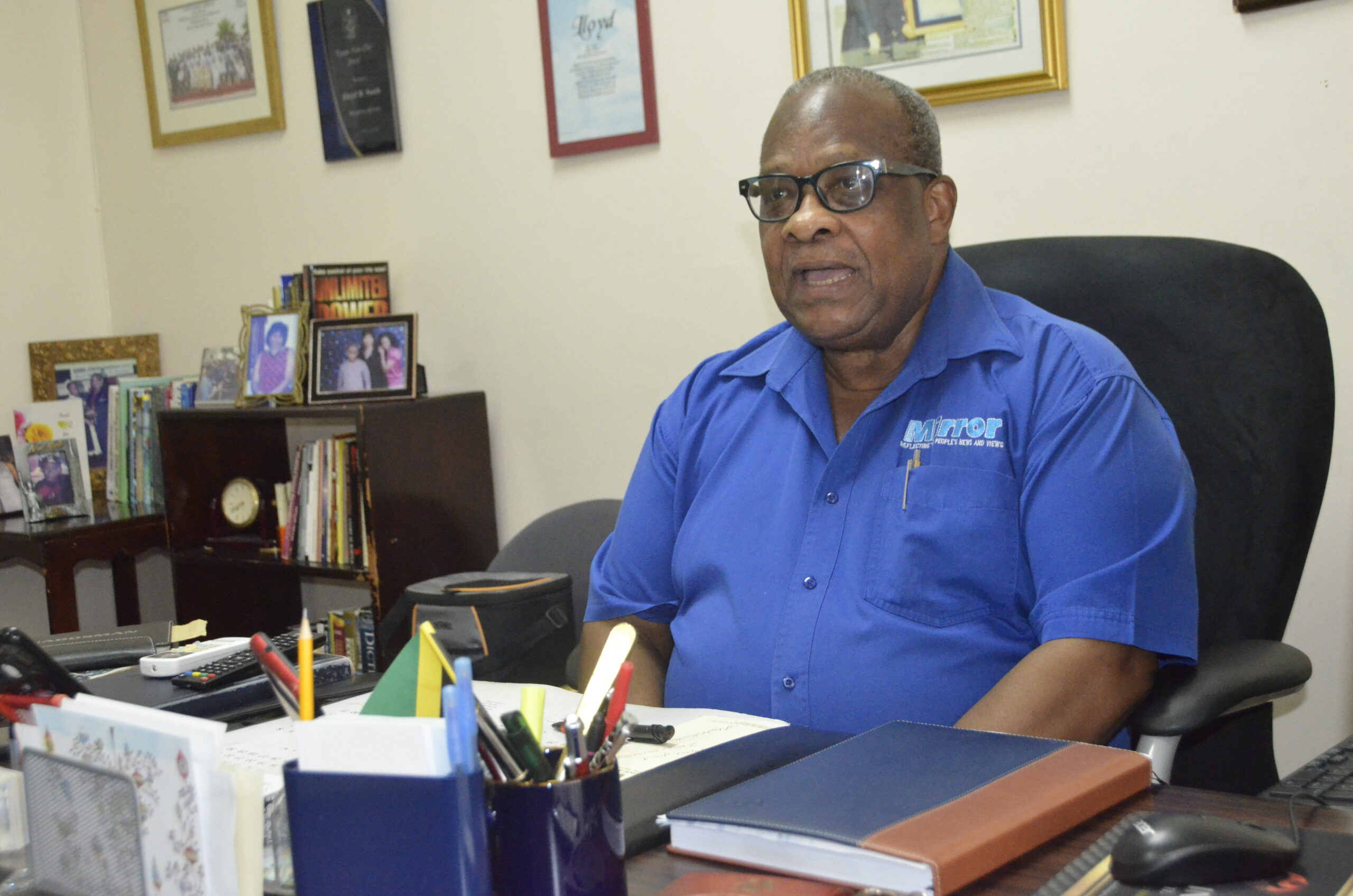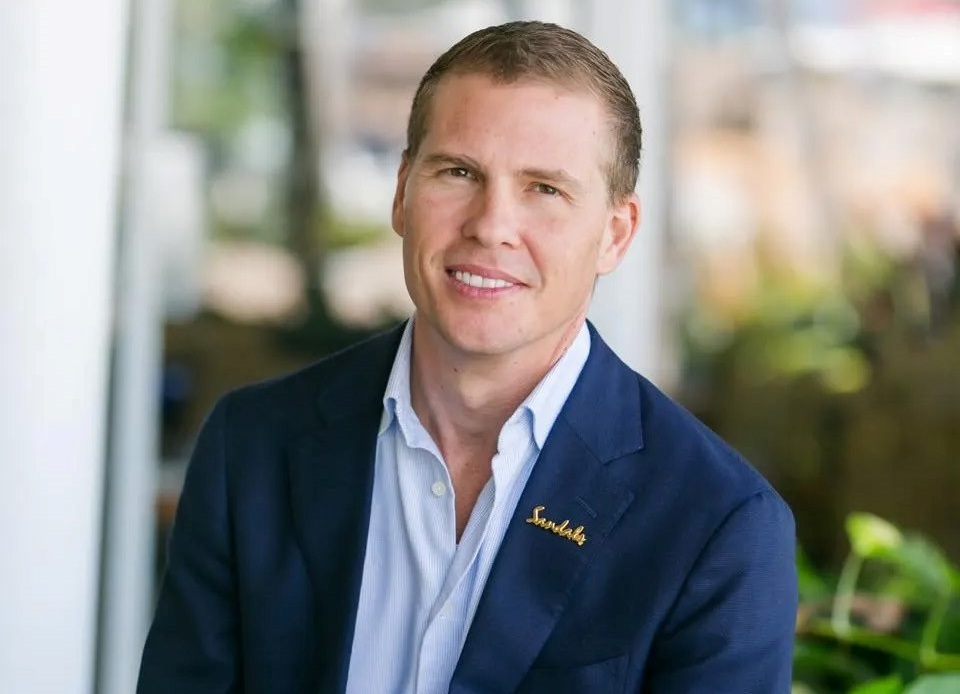BY: SERENA GRANT
JIS
#MontegoBay, Jamaica, November 14, 2022 – The name Lloyd Barnes Smith is synonymous with the city of Montego Bay, St. James as is the popular and much sought-after community newspaper, The Western Mirror, which he has helmed for over 30 years.
Widely referred to as ‘The Governor’, Mr. Smith is renowned for journalistic prowess, sharp business acumen and unwavering generosity to his beloved city.
For these traits, he has, this year, unsurprisingly been conferred with the Order of Distinction in the rank of Officer (OD) for service in the field of Business, Media and Community Service.
The award was presented by Governor-General, His Excellency the Most Hon. Sir Patrick Allen, during the National Honours and Awards Ceremony at King’s House on Monday (October 17), which was celebrated as National Heroes Day.
Born and bred in Mount Salem, Montego Bay, Mr. Smith tells JIS News that he always loved to write.
The proud Cornwall College alumnus discloses that it was during his time in school that he discovered his love for writing after winning a national essay competition.
“I knew I had this innate ability to write and, interestingly, when I was at Cornwall, the boarders would seek to engage young ladies from [neighboring] Mount Alvernia High School for Girls and Montego Bay High School for Girls; in those days you had to write love letters. The letters sometimes took the form of poetry or quotes or just a play on words, and I ended up making quite a little fortune writing the letters for them,” Mr. Smith recounts with a chuckle.
After graduating from Cornwall College, instead of hurdling head-on into the writing career for which he was destined, Mr. Smith went the more traditional route of teaching.
He tells JIS News that he was among the first batch of students to attend the Church Teachers’ College in Manchester, “because the college had just opened and a few of us were selected. I think it was 75 of us in all, to start; later, I graduated with credit from the college.”
Among the schools at which Mr. Smith taught were Holmwood Technical High School and Craig Head Primary School in Manchester, and St. Georges College and Kingston College in Kingston.
He also served as Principal of Oxford Preparatory School. However, during his tenure there, he saw an opportunity to finally segue into his dream career.
“I saw an advertisement in the paper where this particular publishing firm was looking for an editor, and I was always keen on getting back fulltime into publishing and ultimately journalism. It was McGraw Hill, a very well-established publisher internationally, and Kingston Publishers was the local agent for them. So, I got the job and became the editor at Kingston Publishers. I was there for quite a while, editing a few books,” Mr. Smith informs
The journalist established himself as a literary exponent when he edited the first two books ever published about National Hero, the Right Excellent Sir Alexander Bustamante.
The first was entitled ‘Alexander Bustamante and Modern Jamaica’ by Professor George Eaton, which was published in 1975, while the second, ‘Bustamante and His Letters’ by Frank Hill, released the following year.
After making his mark at Kingston Publishers, Mr. Smith joined Jamaica Publishing House, a subsidiary of Teachers’ Book Store, in a sales and marketing position, based in Kingston. He was, however, promoted to the entity’s Western Regional Manager, which saw him returning to Montego Bay.
Now back home, Mr. Smith once again gave in to his urge to write. Always still in pursuit of his journalism dreams, he approached the editor of a small community newspaper based in Montego Bay, called The Beacon, to write a column.
“I started to write a column under the pseudonym ‘The Republican’. It turned out to be a very controversial column because I was hitting left right and centre, upsetting the status quo, making life miserable for those in authority,” the newsman says with a twinkle in his eye.
The stir created by Mr. Smith’s column reflected in paper sales, and the rest is history. Soon, destiny landed him a full time job at The Beacon, where he became the editor. However, when he started in his new job, he realised that the publication’s operations were collapsing.
The owner and director of the paper, who had welcomed Mr. Smith with open arms, unceremoniously left the entity.
The entity also suffered the misfortune of its printing press being seized by the bank funding its operations through a loan, for which the equipment was used as collateral, after the firm defaulted.
This made the newspaper heavily dependent on a popular printery in Montego Bay, a move which drained its then meagre funds. These misfortunes left a shocked Mr. Smith to pick up the pieces.
“The paper was crumbling, no ads; [for] many weeks, [the] staff didn’t get paid. I even went home for several weeks [with] no salary and the workers started to rebel; there was unrest,” he recounts.
“One day, one of the workers said, ‘Mr. Smith, you look like our only hope here; what can you do for us? We want you to take over the business’. I said ‘I couldn’t do that. If I were to move in such a position, you all would have to write a letter that clearly [states this]’; so they did the letter,” he says.
Thereafter, the editor formed a management team and got to work, and in 1980, out of the ashes of The Beacon, The Western Mirror was born, published by its own publishing arm, Western Publishers Limited.
It was not an easy undertaking, as rebuilding the company took grit, determination and, most of all, heart.
Mr. Smith recounts how the company finally acquired another printing press but, unfortunately, they could not afford to charter a vehicle to bring it the paper’s location. He emotionally recalls how dedicated staff members pushed the press on a cart across town to the Western Mirror’s location at the time.
Even with his running of the newly formed company, Mr. Smith was awarded a media fellowship by the then United States Information Service (USIS) to study mass media at the Newhouse School of Communication at Syracuse University, New York, USA, in 1985.
With over 45 years in media and contributions to several other fields, Mr. Smith’s accolades and professional accomplishments read like the making of a well-rounded man of excellence.
In addition to being Managing Director and Editor-in-Chief of the Western Mirror, Mr. Smith holds the distinction of being the longest serving columnist of the Jamaica Observer, writing for the publication since its inception in 1993. He also copped the Pegasus News Chief Award and the Advertising Agencies Association of Jamaica (AAAJ) Media Personality of the Year and lifetime achievement Award, in 2008.
The veteran also received the Sam Sharpe Award for Journalism from the St. James Municipal Corporation and Montego Bay Chamber of Commerce and Industry Award for notable contribution in the field of Journalism.
Under Mr. Smith’s leadership, the Western Mirror has received numerous awards and citations, including the Press Association of Jamaica’s Best Small Publication Award on six occasions, the Marcus Garvey First Memorial Achievement Award, Print Media and the St. James Parish Council Trailblazer Award in recognition of Montego Bay’s 35th Anniversary of its attainment of city status.
In addition to his media career, Mr. Smith is a former Member of Parliament and was Deputy Speaker of the House of the House of Representatives in 2011.
In the area of philanthropy, Mr. Smith was the chief sponsor and organiser of the Lloyd B. Smith Community Football League in St. James from 1979 to 2019. He is also an honorary director of the Committee for the Upliftment of the Mentally Ill (CUMI), and a Justice of the Peace (JP).
He is an accomplished theatre actor and was first from western Jamaica to cop the local Actor Boy Award for Best Actor in a Leading Role.
Mr. Smith is married and the proud father of two children.
While his list of accolades keeps growing, the veteran newsman remains the undisputed ‘Governor’ of Montego Bay.
Contact: Serena Grant
Release: JIS
Photo Caption: Managing Director and Editor-in-Chief of the Western Mirror, Lloyd B. Smith.
Serena Grant Photo


 News4 days ago
News4 days ago
 TCI News6 days ago
TCI News6 days ago
 News3 days ago
News3 days ago
 Bahamas News1 day ago
Bahamas News1 day ago
 News5 days ago
News5 days ago
 Bahamas News2 hours ago
Bahamas News2 hours ago
 Health2 hours ago
Health2 hours ago
 Caribbean News4 days ago
Caribbean News4 days ago












